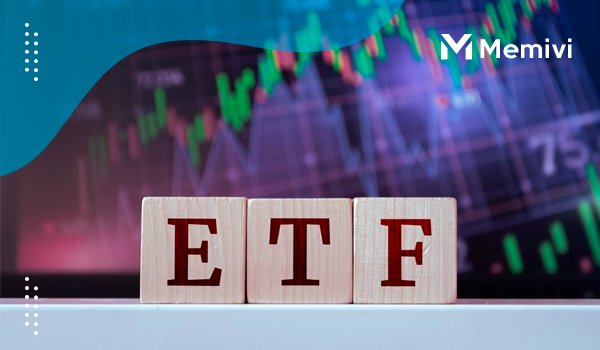
Cryptocurrency has been one of the hottest topics in the financial world lately. In this post, we will be unveiling the 7 best Bitcoin ETFs available and providing you with all the information you need to navigate the market and make an informed investment decision. From fees and performance to risk and liquidity, we will cover everything you need to know about these top-performing Bitcoin ETFs.
Understanding the basics: What is a Bitcoin ETF?
Before diving into the world of Bitcoin ETFs, it is crucial to understand the basics of what exactly a Bitcoin ETF is. An ETF, or Exchange-Traded Fund, is an investment vehicle that tracks the performance of a specific index, sector, commodity, or asset class. In the case of a Bitcoin ETF, it tracks the price movements and performance of Bitcoin.
Unlike investing directly in Bitcoin where you need to set up a digital wallet and deal with the complexity of buying and storing the cryptocurrency, a Bitcoin ETF offers a more accessible and convenient way to gain exposure to Bitcoin.
Essentially, a Bitcoin ETF allows investors to indirectly invest in Bitcoin without owning the actual cryptocurrency. Instead, they purchase shares of the ETF, which represents a proportional ownership in the underlying Bitcoin assets held by the fund. This indirect investment approach provides several advantages.
Factors to consider when evaluating Bitcoin ETFs
When evaluating Bitcoin ETFs, there are several factors to consider in order to make an informed investment decision. These factors can help you determine the potential for growth and the level of risk associated with a particular ETF.
- Fund Objective: Start by understanding the objective of the Bitcoin ETF. Some ETFs may aim to track the price of Bitcoin directly, while others may focus on investing in companies involved in the blockchain technology or cryptocurrency industry. Determine whether the fund’s objective aligns with your investment goals and risk tolerance.
- Expense Ratio: Take a close look at the expense ratio of the ETF. This is the annual fee charged by the fund for managing your investment. Lower expense ratios can have a significant impact on your overall returns, so it’s important to compare the fees across different ETF options.
- Liquidity and Trading Volume: Consider the liquidity and trading volume of the ETF. Higher liquidity ensures that you can easily buy or sell shares at fair prices without experiencing significant price differences or delays. Look for ETFs with substantial trading volume to ensure smooth transactions.
- Holdings and Diversification: Examine the holdings of the Bitcoin ETF and assess the level of diversification it offers. A well-diversified ETF can help mitigate risk by spreading investments across various assets or companies within the cryptocurrency industry. Evaluate whether the fund’s holdings align with your risk appetite and desired exposure to the Bitcoin market.
- Performance and Historical Returns: Review the performance and historical returns of the ETF over different time periods. Although past performance is not indicative of future results, it can provide insights into how the ETF has performed during different market conditions. Look for consistent and competitive returns compared to benchmark indices or other similar ETFs.
- Regulatory Approval and Oversight: Consider the regulatory approval and oversight of the Bitcoin ETF. Regulatory bodies play a crucial role in ensuring investor protection and market integrity. ETFs that have obtained necessary approvals and comply with regulatory requirements may offer a higher level of confidence and transparency.
- Expert Analysis and Ratings: Consult expert analysis and ratings from reputable sources. Financial institutions, investment research firms, and industry experts often provide insights and ratings on various ETFs. These analyses can help you evaluate the strengths and weaknesses of each ETF, providing valuable guidance in your decision-making process.
By carefully considering these factors, you can navigate the market and make informed choices when selecting the best Bitcoin ETFs that align with your investment objectives, risk tolerance, and market outlook. Remember, thorough research and due diligence are key to successful investing in the cryptocurrency space.
Top 7 Bitcoin ETFs to watch out for

If you’re interested in investing in Bitcoin but prefer the convenience and accessibility of an ETF (Exchange-Traded Fund), then you’re in luck. The market has seen a surge in Bitcoin ETFs, making it easier than ever for investors to get involved in the exciting world of cryptocurrency. Here are the top 7 Bitcoin ETFs to watch out for:
- Grayscale Bitcoin Trust (GBTC): This ETF is one of the most popular options for investors looking to gain exposure to Bitcoin. It provides a simple and secure way to invest in Bitcoin without worrying about storage or security.
- Purpose Bitcoin ETF (BTCC): Launched in 2021, this ETF became the first Bitcoin ETF to be approved in North America. It offers investors a convenient way to gain exposure to Bitcoin through a traditional brokerage account.
- Bitwise 10 Crypto Index Fund (BITW): This ETF provides investors with exposure to a diversified basket of cryptocurrencies, including Bitcoin. It aims to track the performance of the Bitwise 10 Large Cap Crypto Index.
- VanEck Vectors Bitcoin ETF (VBTC): With its focus solely on Bitcoin, this ETF aims to provide investors with a convenient way to access the performance of Bitcoin. It offers exposure to physically settled Bitcoin futures contracts.
- 3iQ CoinShares Bitcoin ETF (BTCQ): This ETF provides investors with exposure to Bitcoin through physically settled Bitcoin holdings. It aims to provide long-term capital appreciation by investing in a diversified portfolio of Bitcoin.
- Evolve Bitcoin ETF (EBIT): Another Canadian Bitcoin ETF, EBIT offers investors a convenient way to gain exposure to Bitcoin through a security listed on a major stock exchange. It tracks the performance of the Bitcoin Reference Rate.
- CI Galaxy Bitcoin ETF (BTCX): This ETF provides investors with exposure to Bitcoin through direct investment in the cryptocurrency. It aims to provide long-term capital appreciation by investing in a diversified portfolio of Bitcoin.
These top 7 Bitcoin ETFs offer different features and investment strategies, so it’s important to do your research and choose the one that aligns with your investment goals and risk tolerance. Keep an eye on these ETFs as they continue to evolve and shape the cryptocurrency market.
How to choose the right Bitcoin ETF for your investment strategy?
Choosing the right Bitcoin ETF for your investment strategy requires careful consideration and analysis. With the growing popularity of cryptocurrencies, there is an increasing number of Bitcoin ETFs available in the market.
Here are some key factors to consider when making your selection:
1. Objectives and Strategy: Begin by understanding the objectives and investment strategy of the Bitcoin ETF. Some ETFs may focus on tracking the price of Bitcoin directly, while others may adopt a more diversified approach by including other cryptocurrencies or investing in blockchain technology companies. Determine which approach aligns with your investment goals.
2. Track Record and Performance: Evaluate the track record and performance of the Bitcoin ETF over time. Look for consistent performance and consider factors such as annual returns, volatility, and expense ratios. Historical data can provide insights into the ETF’s ability to deliver returns in line with your expectations.
3. Fund Size and Liquidity: Consider the size and liquidity of the Bitcoin ETF. Larger funds tend to have more liquidity, which can make it easier to buy or sell shares without impacting the market price. Higher liquidity also ensures that the fund can efficiently track the underlying asset.
4. Fees and Expenses: Examine the fees and expenses associated with the Bitcoin ETF. Expense ratios can vary, and it’s crucial to understand how these costs may impact your investment returns over time. Compare fees among different ETFs and weigh them against the potential benefits offered.
5. Regulatory Approval: Check if the Bitcoin ETF has obtained regulatory approval. Regulatory oversight can provide investors with a certain level of confidence and protection. Keep in mind that regulatory approval may vary across different jurisdictions, so consider the legal and regulatory landscape in your country.
Final Thoughts
We hope you found our blog post on the 7 best Bitcoin ETFs informative and helpful in navigating the market. As the popularity of cryptocurrencies continues to rise, investing in Bitcoin ETFs can be a smart move for both experienced and new investors. By carefully considering the factors discussed in this article, you can make an informed decision and potentially maximize your returns. Remember to stay updated with market trends and consult with a financial advisor if needed. Happy investing!



 Inheriting a Windfall: Essential Steps to Secure Your Financial Future <p class='sec-title' style='line-height: normal; font-weight: normal;font-size: 16px !important; text-align: left;margin-top: 8px;margin-bottom: 0px !important;'> It's important to remember that the way you handle this money can have a significant impact on your financial future. </p>
Inheriting a Windfall: Essential Steps to Secure Your Financial Future <p class='sec-title' style='line-height: normal; font-weight: normal;font-size: 16px !important; text-align: left;margin-top: 8px;margin-bottom: 0px !important;'> It's important to remember that the way you handle this money can have a significant impact on your financial future. </p>  Navigating Stability: Discover the Top 10 Long-Term Bond ETFs <p class='sec-title' style='line-height: normal; font-weight: normal;font-size: 16px !important; text-align: left;margin-top: 8px;margin-bottom: 0px !important;'> Investing in long-term bond ETFs can be an excellent way to add stability to your investment portfolio. Learn more. </p>
Navigating Stability: Discover the Top 10 Long-Term Bond ETFs <p class='sec-title' style='line-height: normal; font-weight: normal;font-size: 16px !important; text-align: left;margin-top: 8px;margin-bottom: 0px !important;'> Investing in long-term bond ETFs can be an excellent way to add stability to your investment portfolio. Learn more. </p>  Invest with Purpose: Exploring the Best ESG Funds for Responsible Investing <p class='sec-title' style='line-height: normal; font-weight: normal;font-size: 16px !important; text-align: left;margin-top: 8px;margin-bottom: 0px !important;'> As the world becomes more environmentally and socially conscious, there has been a rise in responsible investing. </p>
Invest with Purpose: Exploring the Best ESG Funds for Responsible Investing <p class='sec-title' style='line-height: normal; font-weight: normal;font-size: 16px !important; text-align: left;margin-top: 8px;margin-bottom: 0px !important;'> As the world becomes more environmentally and socially conscious, there has been a rise in responsible investing. </p>